Tips to Avoid Late-Night Cram Sessions
Researchers recommend students to distribute study time throughout the week.
December 7, 2017
Eyes red, muscles sore, you are too exhausted to focus in class, which will bring down your grades and lower your GPA, putting you under immense pressure. This brutal chain of events is caused by studying late at night.
According to Psychology Today, late night studying hurts students academically and physically since it increases stress and anxiety. However, there are ways for students to get their homework done quickly and sleep on time without any worries. Using these methods may help students manage their time efficiently and develop good study habits, as long as they are practiced consistently. Furthermore, students will have to exert some efforts if they want these strategies to benefit them and make their life easier.
Schedule
It is likely that students may lose track of time while studying late at night. Making a schedule is probably the best way for students to maintain a balance between the amount of time they spend doing homework, extracurricular activities, hobbies, etc.
According to Psychology Today, “the remedy to this problem is not to study less, but rather to create a schedule that allows for sufficient study time and sufficient sleep time.”
Finish Assignments Ahead of Time
For some students, it’s very hard to commit to and strictly follow a schedule, causing them to fall behind with their studying. Behavioral Therapist and Certified School Psychologist Natascha Santos, recommends finishing assignments before hand.
“Preparing for tests ahead of ahead of time can reduce anxiety, and finishing assignments ahead of schedule can be rewarding for students,” Santos said.
Students should study everyday and not cram the night before a test, Santos said.
Eliminate Distractions
To solve the problem of procrastination, students must tackle the root cause of procrastination: distraction.
Sophomore Sanjana Venkatasubramanian talked about how she eliminates her distractions.
“ I just put my phone away because it’s a distraction, and sometimes, I get into texting people for too long,” Venkatasubramanian said.
Break It Up
Another technique that Santos advised is to complete assignments in small chunks. By using this technique, students will feel less overwhelmed by their workload.
Santos said, “Don’t dump it all in one piece, but break it up into smaller tasks,” and be proactive, so it doesn’t come crashing down.”
According to an article “3 Tips for Parents to Teach Healthy Study Habits to Teens” by Keeley Sheehy, researchers agree that study time should be distributed throughout the week.




